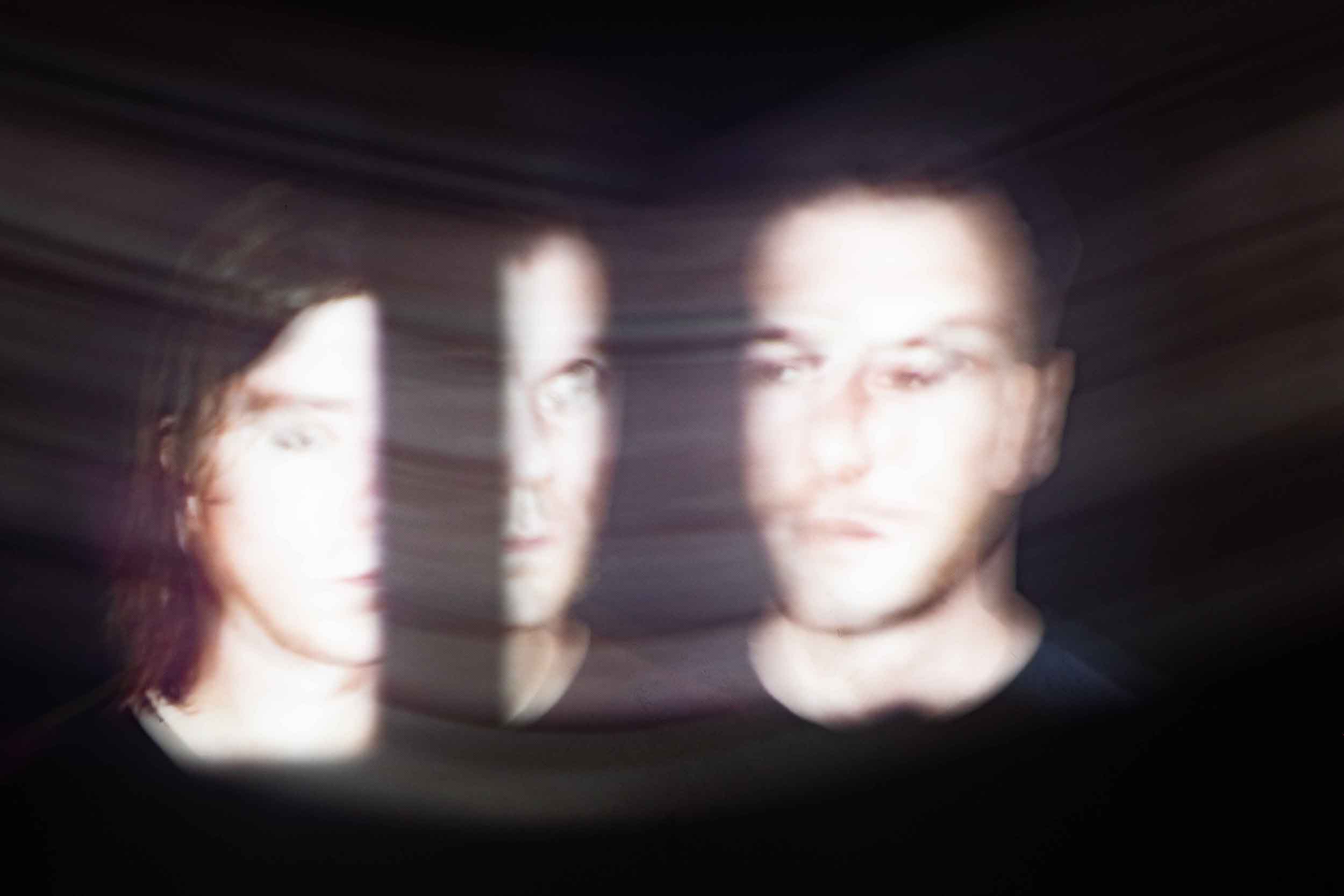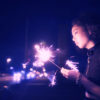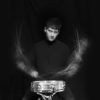Photography FIONA GARDEN
Interview ANDREW PARKS
As anyone who lived through the ’80s and ’90s knows, the idea of fusing heavy-metal with electronic music isn’t a new thing. The problem—unless you’re Justin Broadrick—is doing it well.
James Kelly and Jack Adams are well aware of this. It’s one of many reasons why they approached their new Bliss Project project from a different angle than simply grafting rock guitars onto rough beats.
“We had a few conversations where we didn’t understand each other’s points of view,” explains Adams, “where one of us wanted an obvious [metal or electronic] trope. We wanted it to be intense, but also have class.”
Kelly is an especially tough position, for he’s been here before. While Adams is best known for his multi-faceted productions as Mumdance, his Bliss Signal bandmate spent seven years making increasingly experimental black-metal with Altar of Plagues.
“I was very conscious of the fact that this is the first metal-y, guitar-based thing I’ve done since that band,” says Kelly, who now records avant-pop music under the alias WIFE. “That’s why it was important for the project to speak for itself. Anything else that happens beyond that is just cool.”
“For us, it was one session,” adds Adams. “Then it was one show, a couple tunes, and now an album. It keeps snowballing. I really like that organic way of doing things. Nothing’s forced that way.”
In the following exclusive, Bliss Signal explains how they went from playing a fairly impromptu Unsound show to finding the perfect middle ground between Emperor and The Prodigy on this week’s self-titled LP for True Panther and Profound Lore….
So what are you both up to this week?
James Kelly: I just finished scoring a TV show, so I’m kind of done with music for five minutes. I’m just chilling, playing some guitar, waiting for this Bliss thing to drop.
What TV show?
James: A thing called Shooter. I scored it with Bobby [Krilic]. He makes music as The Haxan Cloak.
Oh wow; that’s awesome!
James: Yeah, it’s this thing with Ryan Phillippe. It’s based on a movie that had Mark Wahlberg in it. They let us do lots of like sub-bass, fucking heavy drops. So that was fun.
What about you Jack?
Jack Adams: I just finished a mix project. I’m trying to decontextualize the idea of the compilation in an age where mixes are abundant and free. It’s somewhere between a DJ-Kicks thing and a Fabric CD—100-percent unreleased, exclusive music from all over the place. New producers, old producers, pioneers….
Are you putting that out on your own label?
Jack: It’s going to be the first release on a sub-label of Different Circles called Shared Meanings.
What’s the vibe of that label going to be like?
Jack: The Different Circles catalogue kind of sits on its own. Mix projects and CDs are quite ephemeral by nature, so we want it to be apart from that.
James: It’s always hard to know which [mixes] are worth giving your time to, because they’re usually an hour and like a hundred come out in a week. So I feel like when someone’s getting ready to do a release like Jack is, you put your trust in him. ‘Alright, he’s put enough effort into this, cultivating all of this original music. I’m going to give it my time now.’ You know?
Jack: Cheers mate.
Are you admitting that you’re just like the rest of us: overwhelmed by choice?
Jack: Everyone is, yeah. I get sent like 50 tracks a day. It’s carnage.
Well, it’s that, and now that we have access to everything on Spotify, there’s sometimes a desire to just listen to old stuff.
Jack: See, that’s the thing with Spotify; it gives you the encyclopedia of every bit of music in the whole world, and I just listen to the same 10 things on it that I did when I was 16. It’s mad. I find it really hard to explore it; the algorithms aren’t made for the long tail. It’s for the 90-percent of people who just want the mainstream stuff.
Well, how old are the two of you?
Jack: I’m 34.
James: I’m 31.
So you both remember having CDs and stuff like that?
Jack: Oh god, yeah.
I feel like the idea of Spotify would have blew my mind as a kid, but it’s weird; it’s almost like we listened to more music when we had less access because you had to actively seek it all out.
Jack: That’s true. I’m always listening to music; it’s been a constant thing since I was young. It’s just nice to explore stuff.
What’s a record that cut through the noise recently?
James: The new Low album. I’m into anything that’s kinda less-is-more these days. I feel like everyone is hammering people over the head with their production lately, and that record’s really subdued and quiet—a vibe I’m really feeling at the moment.
Jack: It’s a difficult question for me because I’ve been putting this mix CD together. I had to get it down to like 30 tunes from about 500, so I haven’t been listening to anything else but demoes over the past month. But I always find musique concrète inspiring—people like Bernard Parmegiani. It’s good music to listen to on trains and planes.
What do you love about it? Just the literal sound of it? I mean, it’s not like something you chill out to….
Jack: It’s like watching a film or going to an art gallery; it’s just in your head, as cheesy as that sounds. It’s not just the sound manipulation. It’s the sense of space and emptiness—everything about it. If you listen to my music, it’s basically all influenced by musique concrète in some way.
What about you James? What’s something formative that people don’t normally associate with your work?
James: The analogy I usually give is the first two tapes I ever owned: Metallica’s Black Album and Prodigy’s Music For a Jilted Generation. That literally defines my taste then, and everything that’s come after it. For years, I’ve always been deeply into metal and electronic music. That’s how I went from being in an experimental black-metal band to doing what’s essentially a pop record.
That love of electronic music was lurking just beneath the surface when you were doing Altar of Plagues then?
James: Yeah, it was always in there, but I feel like a band has a certain template, whereas when I first started producing music on a laptop, I could say ‘I want a zither on this track’ all of a sudden. You can grab anything; there’s so many choices, it’s debilitating in a way.
That’s true, but it’s not like that band played really straightforward black-metal. It was pretty out there.
James: For sure. I struggle to have much objectivity with anything I do; even with Bliss Signal, in my mind, I thought it was definitely metal. But then a good litmus for me is I’ll play things for my brother. He’s more of a club guy with zero interest in metal, and he was referencing all of these hard techno projects he thought it sounded like.
Like what?
James: Stuff like Ancient Methods. That’s cool for me because it means the record doesn’t just sound like X/Y/Z; we’re able to put all of this weird stuff in the melting pot. And if it comes out sounding like something else, that can only be a good thing.
Well there’s a lot going on with the project.
Jack: Following up on what James was saying earlier, I was just thinking the other day how young we are when our musical tastes are formed. For me, half of my musical tastes came out of watching BMX and skate videos, and the other half came out of hardcore tapes.
Hardcore punk or hardcore techno?
Jack: Happy hardcore.
It’s interesting that you mention skate videos, because they’re almost like the ultimate mixtape, with hip-hop one second, and punk the next.
Jack: Definitely man. That’s how I found out about guitar music, really. A lot of American bands didn’t play here as much, so I’d watch those videos, pause them at the end, write down all the names, and then a lot of times, you’d have to import [the records]. And sometimes you might not even like the rest of the album after all that. But yeah; it’s one of those things where you start with punk rock and pop punk—those are your gateway drugs. And then 10 years later, you’re suddenly listening to black-metal.
Did you guys meet, or talk about working together, before Unsound reached out?
James: Yeah, Jack and I met in Tokyo in November 2014, when we were both doing the Red Bull Music Academy. I think we met on the first day, and we were already familiar with each other’s stuff. I was like, ‘Oh, you know my project WIFE.’ And Jack was like, ‘No, I’m into Altar of Plagues.’ It’s like, ‘What the fuck?’ And I was into the grime stuff he was doing at the time, so we hit it off and stayed friends. We kept talking about creating this thing that didn’t exist yet, and then Jack visited Berlin in April of last year. We went rowing on a boat, got a little bit drunk, and decided to start doing this thing. He booked a flight to come back a month later.
The Unsound thing was like being in a band and booking your first show before you have music.
To light a fire under your ass basically?
James: Exactly. I’ve done that with bands so many times. Unsound listened to a 30-second demo we’d done and they were pretty into it, so they gave us a pretty crazy slot. That lit the fire under us.
Jack: We had a good relationship with Unsound, because we’d both performed there before—James with Altar of Plagues, and me with Novelist a few years back. But yeah; it was one of those things where you say ‘we should do this’ when you’re having a few beers, and then we actually did it. I’m just happy for that, really. Because there’s been many times where I’d talked about doing things before and it just never happened. And you know what? It’s happened so naturally.
James: We literally called our first song “Bliss Signal” because it felt like our mission statement.
Jack: And we worked backwards from there. The writing process was an absolute pleasure. I do a lot of collaborations; sometimes it’s hard, and sometimes it’s not. This one fell into place super easily. It just all happened, which was really nice. With Unsound,about six weeks beforehand, we were like, ‘Oh shit, we don’t have any music!’ So we spent two weeks working really hard—smashing it, smashing it, smashing it—and we ended up with the majority of an album from that. It was all about pulling it apart and fine-tuning it from there.
We decided to go with a short album, so it could feel like more of a piece. It’s not supposed to feel like a selection of singles; it’s supposed to feel like something you’d listen to from start to finish. With everyone’s attention spans depleting monthly, we decided to not do an epic. It’s a nice introduction to what we’re doing.
James: From my perspective, I’m coming out of a band that wrote 22-minute songs. These days, I’m into the more raw shit—songs with a couple riffs. Just a two-minute banger—boom, and that’s it. One of the criticisms of the [Bliss Signal] record was in Wire; it said we didn’t go grandiose enough. We both felt it’s already called Bliss Signal, and it’s deliberately euphoric in parts. But I don’t want to hammer people over the head with sentimental stuff. I’d rather be understated than extra epic and over-the-top. I think that can dumb it all down a bit. It treats people as if they can’t get it otherwise.
Jack: That’s it, man. The more I make music, and the older I get, the more I realize it’s not really your job to decide what it is. You just make music, put it out there, and the people who listen to it create the meaning. Not just the personal meaning, but how it fits into the wider world. It’s nice not being too explicit with things.
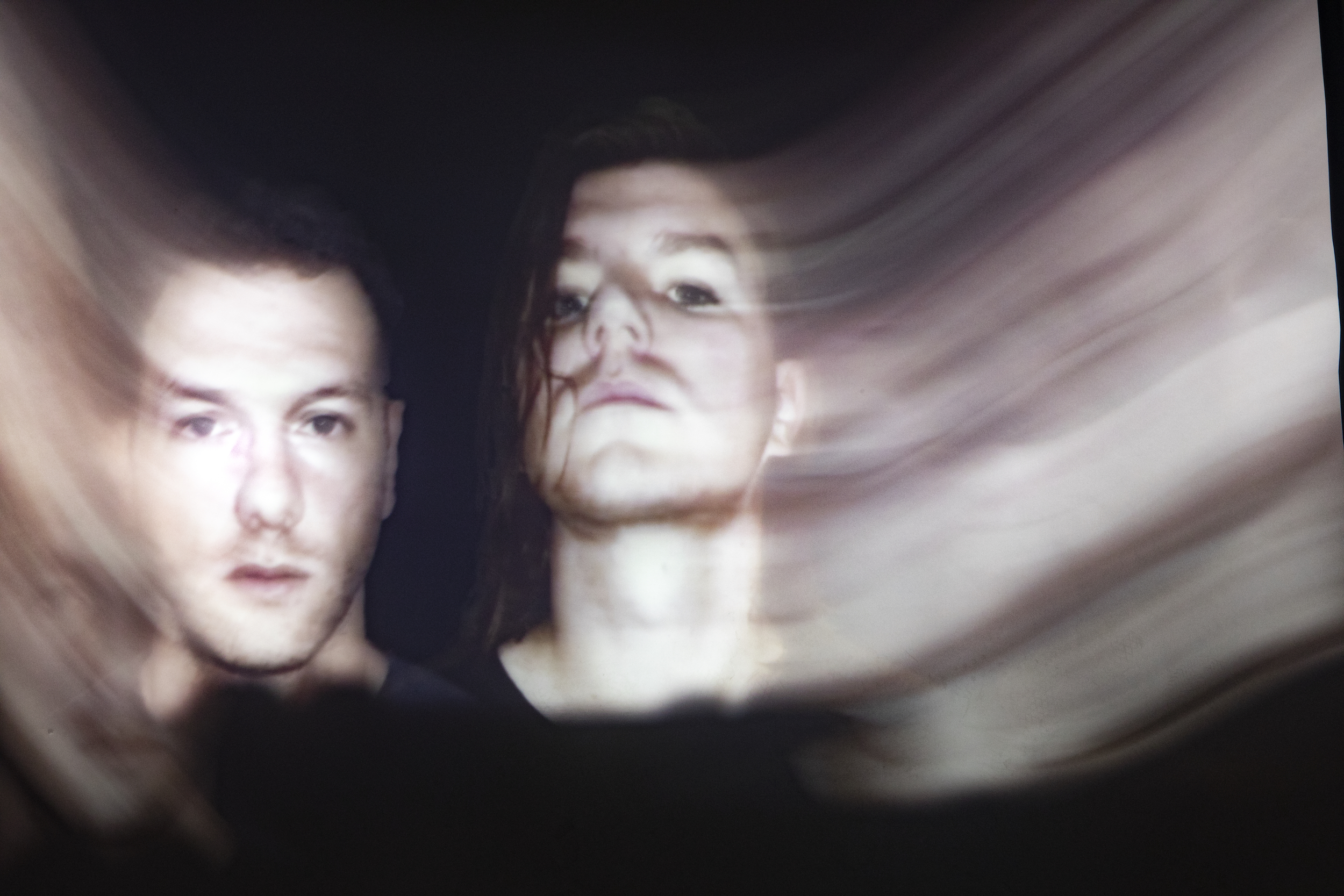
When you had those couple weeks to start banging tracks out, what was your mood board like, so to speak?
Jack: We had a playlist of ideas. If you think about most electronic/metal collaborations, they’re fucking awful. Really, really awful. Because they’re either people who are into metal and know nothing about electronic music, or they’re into electronic music and have bad taste in metal. You know what I mean? Prodigy are probably the only ones who’ve done it [well]. That’s obviously not the way we’re going, but….
James: One of the first things we drew lines between was some of the early Norwegian black-metal—Emperor and things like that. This triumphant, reaching towards euphoria thing. And then on the flip side of that, jungle and certain strains of drum ‘n’ bass are going for euphoria also. What’s driving both of these things is really intense, propulsive rhythms. So we were like, ‘What if we strip out the blast beats and go really hard with 909s or whatever drum palette we decide to use? Then pair that with euphoric shredding?’
Jack: It really is a distillation of the two. And there’s a little shoegaze influence as well. Kind of like Jefre-Cantu Ledesma; we’re big fans of him.
James: We were definitely trying to meld things that feel like they belong together. For instance, the lo-fi, ambient shred of black-metal didn’t come out of listening to My Bloody Valentine, but they have a similar vibe. For us, it’s all about looking at those things from a different angle. We also wanted to have the cold, clinical thing of drum ‘n’ bass going on, like the opening track that is just minimal bleeps and static.
Jack: We didn’t over think anything, either. Because we wrote it quickly, it’s a nice even mix of our two production styles.
I like that idea—that it’s a vibe, not a literal fusion of electronic beats and rock guitars, the way some ‘electronica’ was in the ’90s.
James: Totally. Jack and I are both pretty strong-minded. He’ll school me for days on the strains of the UK hardcore continuum, and between the two of us, we’re able to knock it all down to the thing we ended up with.
Jack: Or I’d say something—my idea of ‘metal’—and James would be like, ‘No, we cannot do that.’ And he’s right; he’s more well-versed in that corner. Which is a good thing.
James: I’m not a total authority on the matter, but in general, drum machine-led metal—with the exception of Godflesh—tends to not work for a bunch of different reasons. And it’s the same case with electronic takes on metal. Like when dubstep started bringing in chugging. It just doesn’t work.
Jack: Well this is supposed to be the sum of our parts. So when we had different ideas of how we should do things, we had to work through it until we were both happy. What happened over time is it almost fell into the formation of instruments in a band. You know? We found our drum palette; we found our synth palette; we found our guitar chain, and all of the effects that we like. Everything just fell into place. Whereas with electronic music, I’m always striving to make every song different.
James, is this something you’ve been itching to do, since it’s been a minute since you made anything metal-related?
James: Yeah. Not to go off at length about metal, but there was definitely a reason I felt exhausted and was hitting my head against a wall in that world. Even with Altar of Plagues; we tried to do some things a little different on the last record and it was still the same fucking meatheads in their sketchy band T-shirts in front of me at shows. I felt like I was stuck in this place I didn’t want to be in. I keep my ear on what’s going on with things, but the trends tend to be like the death-metal thing right now. It’s all a pastiche of early Morbid Angel. To me, that’s not exciting. As a fan, it’s just regurgitating the canon.
What’s appealing about this project, even if we’re not reinventing the wheel, is it’s this whole new way of me riffing against a 909 kit. It’s this new, exciting template to work within. That got me excited about playing the guitar again. The record also doesn’t have vocals outside of the last track. Despite being someone who screamed on a lot of records, I’m personally in a place where I’m a happy guy. And I don’t think the world needs a happy guy screaming at them on a record. That just feels theatrical and insincere to me—something I don’t really want to participate in.
Now that the record’s done, do either of you see using more vocals next time?
Jack: It’s a case of how the project progresses, and not getting bored. If a song needs a vocal, we’ll do a vocal.
James: The screaming thing just doesn’t sit well with me anymore. I still love that stuff; I went to a death-metal show a couple days ago, and I was really into their crazy vocals. But I don’t have a place for that screaming shit in my own life anymore.
Jack, you’re probably best known for the your ‘weightless’ sound as of late, so this record is going to sound like an abrupt shift to some people. Have you always wanted to make a record like this?
Jack: Well, there’s still some elements of the weightless sound in the record. It’s more about the approach, in the same way something is minimal or maximal. Weightless is a loose set of ideas to get you thinking about things in another way. It hasn’t gotten any particular sounds or tropes or famous samples like the “Amen” break in drum ‘n’ bass. Like the first track is basically a weightless track, and “N-16 Drift” is a weightless track as well.
The drone-y stuff, then?
Jack: Yeah, that’s it. I guess weightless is the axis where noise, ambient, grime, New Age, musique concrète, and minimalism all meet. That’s why we keep it quite vague. We’ve got the next one in the [Weightless] series coming up soon and everyone approached it differently. I think that’s quite a beautiful thing.
Right, but have you always wanted to make a metal record?
Jack: I’ve always wanted to write a metal record, yeah. Definitely. I’ve always wanted to do a power ballad and a metal record, and I’ve managed to do both this year. It’s nice, man.
I was reading an interview with that composer who died earlier this year—Jóhann Jóhannsson—and he was saying if you want to get rich, you just keep making the same thing over and over again. But if you’re trying to find your language as an artist, it’s all about challenging yourself. There’s artists who make the same track over and over for 20 years. It’s fair play if it’s worked out well for them, but to me, that seems insane. I need to be challenged. It’s just more fun that way. It’s to my detriment a bit; the overall Mumdance project confuses people because they don’t know where to put me. And it’s the same with James. There’s not an established route with Bliss Signal.
How would each of you describe where your solo projects are at in 2018?
James: I would still refer to WIFE as weird pop. As much as I’d shake the word ‘pop’ off, I think it’s an easy catch-all, especially when you put ‘weird’ in front of it. It covers quite a few bases.
Jack: I don’t really know where I am, man. At the moment, I’m quite into banging out techno in big rooms because it’s something I haven’t done before. For 10 years, I’ve been playing grime parties. It might be mixed with experimental music or something else, but the central sound is still grime. It’s a difficult question—almost seasonal. Like now that we’re headed into autumn, I’m starting to listen to more guitar stuff—to some emo.
Like what?
Jack: Rites of Spring, I guess. All of the Dischord stuff.
Real emo, then!
Jack: Yeah—the post-hardcore stuff. I also like Hot Water Music and Leatherface; things like that were the basis of my teenage years.
Did neither of you go to clubs when you were younger, then?
Jack: I’m from Brighton; there was techno when I as growing up, but it was acid-techno. Very hippie-ish. I didn’t discover proper UK techno until the last 5 or 10 years.
James: I grew up in rural Ireland, so my earliest music access was this 30-minute Top 30 hits show, so you’d get a glimpse of a song for just a second. I feel very fortunate having grown up in the ’90s, when the Chemical Brothers and Prodigy had really good tracks in the Top 10. Some really good stuff. But I didn’t go near a club until I was 18 or 19.
What’s crazy to me is I feel like Bliss Signal is just doing this tiny sliver—a very small glimpse—of what electronic metal can be as a vast genre. It’s crazy to me that more of this stuff doesn’t exist. One of the reasons we’re doing the record with Dean [Bein] from True Panther is that he said this is a project he’d been waiting to hear. There’s obviously stuff like Death Grips operating in a new electronic-metal paradigm, but in general, it’s insane to think that in the year 2018—with all of this insane gear and technology available—that people aren’t bringing these things together. In a way, I think it’s because these two worlds don’t want to be together. It’s been tricky figuring out everything with this project, from the label to our booking agent. We’re not making it easy for ourselves, but we’re excited to explore a new lane.
Jack: Well, a lot of the electronic-metal stuff has this dark mood, and we’re trying to push this euphoric thing. Would you say that James?
James: Yeah, exactly. As a genre, it could be blown up so much bigger. But for some reason, people want to keep drums and guitars on one side of the room, and 909s and synths on the other.
Jack: It’s been nice to work with True Panther and Profound Lore. I don’t think we could have asked for more than that. Because I like bands like Agalloch, too, you know? For James, it’s no big deal since he’s been on Profound Lore for a while, but I’m psyched. We’re getting bookings for metal festivals now and I’m just like, ‘Fucking hell! How did this happen?’
What’s the most daunting booking you have right now?
James: Probably Roadburn. I’ve played it with Altar of Plagues before; I’d call it the Unsound of the metal world. It’s gonna be as open-minded as that world gets. It’s super cool that they took this on, because I don’t think it’s the easiest sell to metal crowds at the end of the day. But we’d like to expand the live thing; we want to bring rave tropes to it, like really banging strobes that really push the euphoria vibe.
Is your set short like the record?
Jack: We’re still working on it. The set so far has been somewhere between a jam session and the rigidity of the song structures. There’s also been bits that are more guitar-based or more like musique concrète in the interludes. You need the dynamics of quiet in there, so the loud bits make sense. Live electronic music isn’t interesting, generally; I’d much rather see a DJ command a room. We want it to be more like watching a metal band. Exciting, you know?
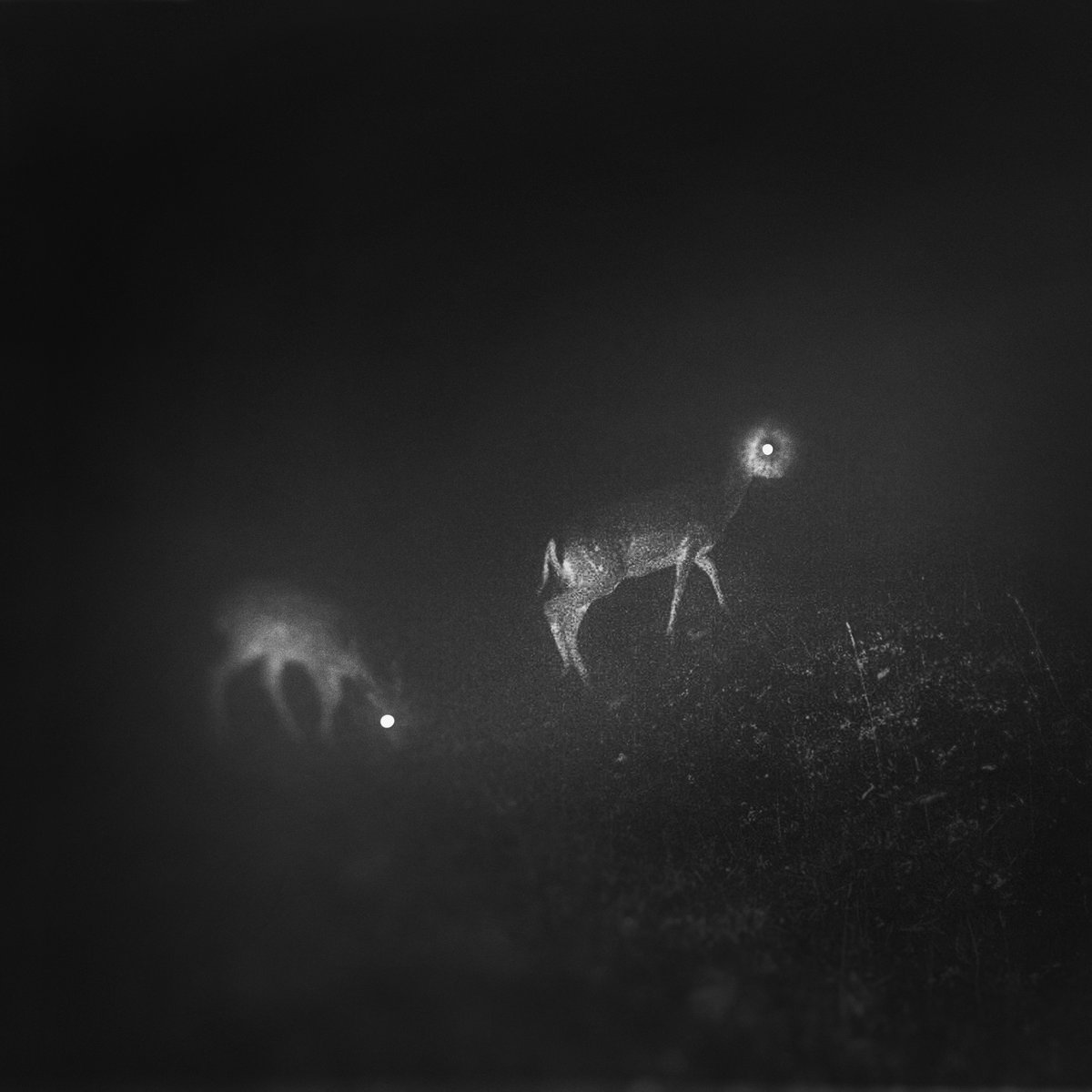
How have you approached the visual side of the project?
James: Like the music, that stuff was more of a process of elimination. We wanted to avoid anything that was overly suggestive—for you to just pick up the record, see the words Bliss Signal and go, ‘I’m not really sure what this record is.’
Jack: That’s it, man. To be honest, the art was more taxing than the music.
Did you start with the name and build everything from there basically?
James: Yeah, we booked that Unsound show and they asked what we were going to be called. We had two songs in the bag then, and started throwing words out, getting it all down on paper until we arrived at Bliss Signal. What I like about it is the ‘Bliss’ covers the sentiment of it, and ‘Signal’ nods to it being modern—the technical side of drum ‘n’ bass and jungle that we’re trying to bring into it. A band name should just feel good to say too, you know?
You mentioned hanging out on a boat earlier, and deciding to do this project that day. Was there something you bonded over besides music?
James: Actually, we had just been at this museum in Berlin: the Hamburger Bahnhof. And they have a really big collection of Joseph Beuys’ early stuff. One of the things that stood out were these really giant pieces of rendered fat that he’d strung together with these crazy, sparse wiring systems.
Jack: Me and James go to art galleries and stuff, but ultimately, this project was formed in the pub, with us drinking beers and shouting over each other more and more over the course of the night that this should happen.
James: It had this sense of urgency, because it felt like a cool idea—like something we needed to get down and out before someone else does.
Jack: It’s not a high or low brow project; it’s a collision. We’re not trying to be too clever. It’s a contrast of working environments, backgrounds, and skill sets—as much about hanging out an art gallery as it is hanging out in a club.
To wrap up, when are your other projects coming out?
Jack: That compilation is coming out at the end of November.
James: I feel like Jack is more prolific than me; in terms of my solo output, I’m crippled with doubt and insecurity. But I’ve had a good year in the sense that I produced an album by an artist called Hilary Woods that just came out on Sacred Bones. And once I finished that, I spent six months working on that TV show. I’m going into a studio next month to do the classic cabin-in-the-woods thing with my gear, alone, for 10 days, writing a record.
Jack: James says he’s not prolific, but the amount of work that goes into scoring a TV show in such a short time frame is absolutely insane.
James: That’s what kills me; I can write 40 minutes of original music in a week for someone else, but when it comes down to my own stuff, it’s like, ‘Fuck.’
